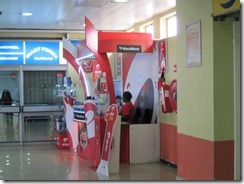In September, Tech Mahindra, India’s sixth largest software exporter announced the acquisition of a 51 per cent stake in Comviva Technologies, a Bharti Group company, and a global player in providing mobile value added services (VAS), mobile money and mobile payment solutions. The acquisition represents a further move by the Tech Mahindra into the telecom space, as India continues to ramp up its software and telecom applications interests across the Middle East and Africa 
Comviva’s Mohapatra says ring back tones have enjoyed enormous success with operators across geographies and the company is confident of replicating this success in Africa
Tech Mahindra announced the acquisition of its stake in Comviva Technologies at a cost of INR260 crore (US$49.2 million), with the view that upon the completion of the deal the company’s new brand identity will be Mahindra Comviva.
As part of the arrangement, Tech Mahindra agreed to make an upfront payment of INR125 crore, with the balance amount of INR135 crore to be paid out over a period of five years based on Comviva achieving mutually agreed performance targets. Bharti Group will continue to hold a 20 per cent stake on a fully diluted basis in Comviva, post the deal closure.
This acquisition will significantly enhance Tech Mahindra’s capabilities in the mobile VAS domain and will provide access to a marquee client base, enabling significant cross-selling opportunities. It dovetails into two of Tech Mahindra’s stated strategies; namely investing in emerging areas such as Network, Mobility, Analytics, Cloud and Security; and further focus on non-linear growth.
Comviva has over 10 years of experience in managing mobile data pipes for more than 80 operators globally across 40+ countries, and the company believes that it is ideally placed to be the solution provider to evolve an operator’s mobile data strategy. The company’s Mobile Data Platform, for example, is a comprehensive data suite offering acceleration, optimisation, smart caching, video caching, P2P caching, policy and bandwidth management, DPI based profiling, and inline billing. In addition, it also enables operators to define policies, perform real-time metering, and caching, as well as transcoding and content adaptation techniques for HTTP, P2P and video content.
"Over the last year operators in West Africa have witnessed huge demand for mobile data, especially in countries like Cote d’Ivoire, Senegal, Burkina Faso, Nigeria, Ghana and Cameroon,” commented Mayank Sharma, vice president, Africa Region, Comviva. “For this they need a solution that can complement their infrastructure and help them launch innovative data services to boost revenues and also ensure efficient network management to minimise the revenue leakages and cost overheads. Comviva’s comprehensive approach to mobile data management enables efficient and effective handling of the various types of data traffic. Our solution helps enhance mobile Internet experience by improving data download speeds."
In recent years Comviva has been making significant inroads into the mobile VAS space across the Middle East and Africa. Early last year the company announced that it had signed a MoU with Starfish Mobile International, one of the leading content aggregators and mobile marketing agencies in Africa. This tie-up with Starfish Mobile further strengthened Comviva’s RBT (Ring Back Tone) content portfolio on the continent.
With the partnership, both Comviva and Starfish Mobile brought their expertise and resources to the table with a content strategy that allows mobile operators to drive the number of users on their networks and to achieve sustainable usage of their services.
Comviva’s RBT content portfolio enables operators to provide a wide range of personalised mobile music applications, allowing subscribers to reflect their personality and emotions.
Prior to the deal with Starfish Mobile, Comviva had also announced entering a MoU with Inmobia, a provider of technology platforms and content for mobile operators. The deal was set to see Inmobia help Comviva provide its RBT content portfolio in Africa. 
Countries in East Africa, including Kenya, have witnessed a boom in mobile data demand, with services including mobile commerce proving highly successful
“Among the varied portfolio of mobile music offerings, ring back tones have achieved killer application status with mobile subscribers in many markets worldwide,” commented Manoranjan Mohapatra, CEO of Comviva at the time. “RBT constantly evolves, creating long-term customer stickiness and providing a sustainable revenue stream for operators. Comviva’s RBT has enjoyed enormous success with operators across geographies and we are confident of replicating this success in Africa.”
Tech Mahindra’s timing to expand further into the mobile application space is impeccable. It has been clear for quite some time that the mobile data growth opportunity is a significant one, and despite starting at a lower base in regions such as the Middle East and Africa, the forecasted consolidated annual growth rates (CAGR) in these regions still make for appealing reading. According to Cisco Systems’ Visual Networking Index (VNI) Global Mobile Data Traffic Forecast 2012 Update, global mobile data traffic more than doubled (2.3 -fold growth, or 133 per cent increase) in 2011, for the fourth year in a row. The research suggests this is a testament to the momentum of the mobile industry given that this growth persisted despite global economic uncertainties, the broad implementation of tiered mobile data packages, and an increase in the amount of mobile traffic offloaded to the fixed network.
Cisco estimates that traffic in 2012 will grow 2.1-fold (110 per cent), reflecting a continuation in the tapering of growth rates. The evolving device mix and the migration of traffic from the fixed network to the mobile network have the potential to bring the growth rate higher, while tiered pricing and traffic offload may reduce this effect.
Cisco VNI Update forecasts that the Asia Pacific and Western Europe regions will account for over half of global mobile traffic by 2016. However, Middle East and Africa will experience the highest CAGR of 104 per cent, increasing 36-fold over the forecast period. Asia Pacific (a region that now includes Japan) will have the second highest CAGR of 84 per cent, increasing 21-fold over the forecast period between 2011 and 2016. The emerging market regions of Central and Eastern Europe and Latin America will have CAGRs of 83 per cent and 79 per cent respectively, and combined with Middle East and Africa will represent an increasing share of total mobile data traffic, up from 15 per cent at the end of 2011 to 19 per cent by 2016.





0 comments ↓
There are no comments yet...Kick things off by filling out the form below.
Leave a Comment